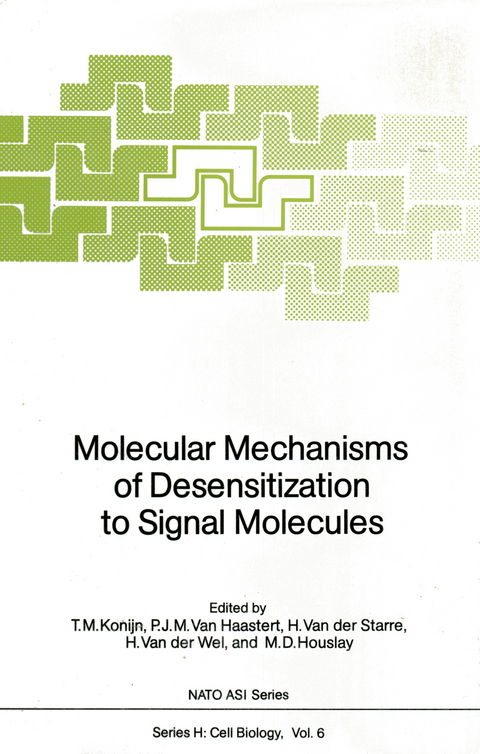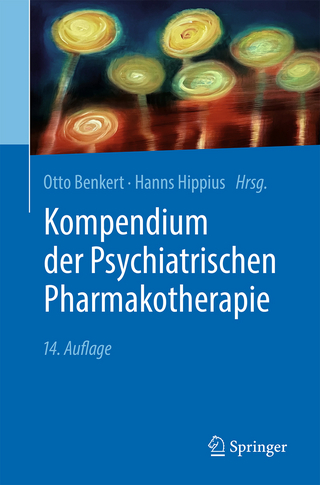
Molecular Mechanisms of Desensitization to Signal Molecules
Springer Berlin (Verlag)
978-3-642-71784-0 (ISBN)
All organisms adapt, or at least try to adapt, to informa tion or signals arising from their surrounding environment. This can affect the behaviour of the entire organism or the functioning of discrete organs or areas within an organism, depending upon its degree of complexity. This workshop was set up with the aim of encouraging discussions and collaboration between investiga tors studying a wide spectrum of signal transduction/sensing events occurring at the cell surface in systems where the sig nalling mechanisms became attenuated or desensitized after their initial stimulation/activation. To this end a wide range of sys tems were dealt with ranging from simple organisms to higher eUkaryotes. Desensitization has been of much interest for some time. Recently, however, a number of novel mechanisms have been elucidated and, in order to capture the present excitement in this field, the participants have been encouraged to produce articles which would present an overview of their field and research effort which, we hope, will be useful to the int- ested non-speciaJist and specialist alike. A brief transcript or the ensuing discussions has also been included ror clarifi cation and to highlight both points of comparison between sys tems and of particular interest.
Chemotaxis and Chemosensing.- Behavioral adaptation in prokaryotes.- Surface receptor mediated activation and adaptation of adenylate cyclase in Dictyostelium discoideum.- Adaptation of Dictyostelium discoideum cells to chemotactic signals.- Adaptation, periodic signalling, and receptor modification.- Adenylate Cyclase-Coupled Systems.- Glucagon desensitization of adenylate cyclase in hepatocytes: an action mediated by a distinct population of glucagon receptors coupled to stimulate inositol phospholipid metabolism.- Cellular adaptation to signal molecules: activation and interaction of different signal transduction systems.- Desensitization of the ?-adrenergic coupled adenylate cyclase. The ?-adrenergic receptor kinase phosphorylates agonist-occupied cyclase-coupled receptors.- Structural microheterogeneity of ß1-adrenoceptors in turkey erythrocytes and their functional consequences.- Adaptive response of beta-adrenergic sensitive adenylate cyclase system.- Hormone specific desensitization of Sertoli cell adenylate cyclase in a cell-free system.- Inositol Phospholipid-Coupled Systems.- Adaptations of receptor-dependent phosphatidylinositol 4,5-bisphosphate breakdown.- Cell responses to phosphoinositide-hydrolysing receptors: some potential sites of modulation.- The kinase C substrate protein B-50 and feedback control of synaptic signal transduction.- Retroinhibition of the calcium-phosphatidylinositol cascade by diacylglycerol in thyroid.- Visual Transduction.- Fast termination and adaptation processes in the cGMP cascade of visual transduction.- Phosphorylation of rhodopsin involved in terminating the visual response.- Ion Conductance.- Permeability control and desensitization by nicotinic acetylcholine receptors.- Cellular Systems.- Regulation of leukocyteresponses to chemoattractants: role of receptors, guanine nucleotide regulatory (N) proteins and phospholipase C.- Modulation of macrophage oxygen metabolism. Evidence for desensitization and activation of the cell response to environmental stimuli.- Antibody induced down regulation of membrane receptors in human diseases.- Concluding Remarks.
| Erscheint lt. Verlag | 17.11.2011 |
|---|---|
| Reihe/Serie | Nato ASI Subseries H: |
| Zusatzinfo | XIV, 338 p. |
| Verlagsort | Berlin |
| Sprache | englisch |
| Maße | 170 x 244 mm |
| Gewicht | 614 g |
| Themenwelt | Medizin / Pharmazie ► Medizinische Fachgebiete ► Pharmakologie / Pharmakotherapie |
| Naturwissenschaften ► Biologie ► Biochemie | |
| Naturwissenschaften ► Biologie ► Zellbiologie | |
| Schlagworte | Activation • Antibody • Calcium • Cell • Hormone • Membrane • Metabolism • Molecular mechanisms • Nucleotide • phosphorylation • Protein • proteins • receptor • Regulation • Research |
| ISBN-10 | 3-642-71784-5 / 3642717845 |
| ISBN-13 | 978-3-642-71784-0 / 9783642717840 |
| Zustand | Neuware |
| Haben Sie eine Frage zum Produkt? |
aus dem Bereich


